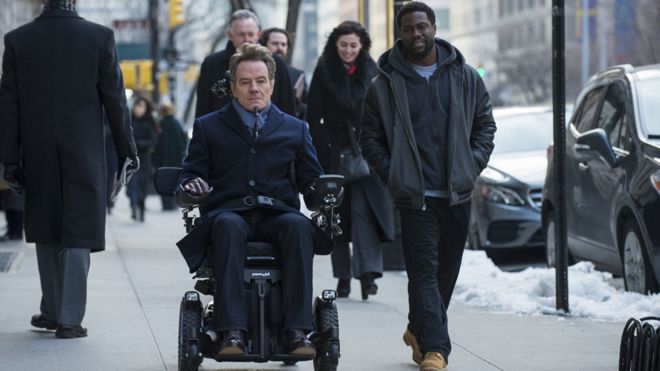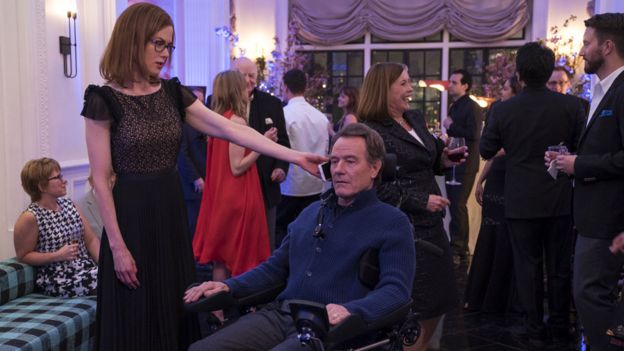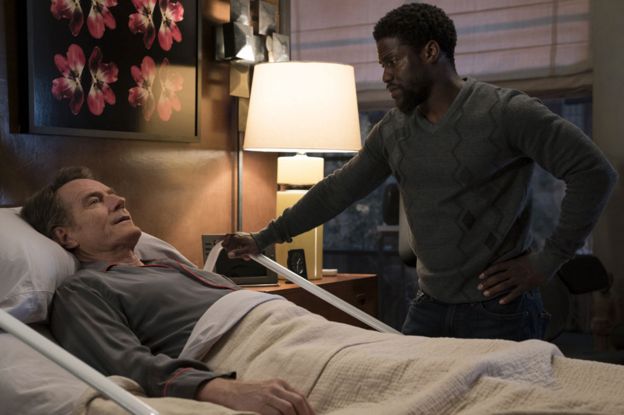jolldan
Sidekick
- Joined
- Mar 6, 2014
- Messages
- 3,716
- Reaction score
- 3,740
- Points
- 103
Breaking Bad star defends disabled role

(Apologies if there is already a topic for this wasn't sure quite what topic it would fit in, thought it would make for an interesting topic since this seems to be an ongoing debate in the entertainment world)
Bryan Cranston has defended playing a disabled character in his latest film, saying his casting as a man with quadriplegia was "a business decision."
In The Upside, the US actor plays a wheelchair-using billionaire who hires a former criminal, played by comedian Kevin Hart, to be his live-in carer.
"As actors we're asked to play other people," said the Breaking Bad star.
Cranston said the subject was "worthy for debate" and there should be "more opportunities" for disabled actors.
Yet he maintained he was entitled to play characters whose attributes and abilities differed from his own.
"If I, as a straight, older person, and I'm wealthy, I'm very fortunate, does that mean I can't play a person who is not wealthy, does that mean I can't play a homosexual?" he mused.
"I don't know, where does the restriction apply, where is the line for that?" he told the Press Association.
Jake Gyllenhaal and Dwayne Johnson are among others who have faced criticism for playing disabled characters.
Gyllenhaal's 2017 film Stronger, about a man who lost both legs in the Boston Marathon bombings, was criticised for not casting a disabled actor in the role.
Last year, meanwhile, Johnson was censured for calling for more disabled actors on screen while also playing a man with a prosthetic leg in action film Skyscraper.
Cranston's comments come in the wake of ongoing debate over whether it is appropriate for straight actors to play gay or transgender roles or for white actors to play characters associated with ethnic minorities.
Scarlett Johansson, Tilda Swinton, Jack Whitehall and Ed Skrein are among those who have faced criticism for accepting certain roles. Some have gone on to withdraw from projects following a backlash.
Last month Darren Criss said he would no longer accept LGBT scripts because he did not want to be "another straight boy taking a gay man's role".
The Glee actor played a gay serial killer in American Crime Story: The Assassination of Gianni Versace - a performance that won him an Emmy in December and a Golden Globe on Sunday.

Hart, meanwhile, believes there are always positives to discussions about diversity and inclusion.
"I think having a conversation started is always a good thing," he said.
"In this particular case, bringing awareness to the fact that hey, we would love to see more disabled people given the opportunities to participate in the entertainment world, and potentially grow."
The comedian turned actor faced renewed criticism himself recently for comments he made in 2010 about his fears that his son might grow up gay.

Britain's Ben Whishaw expressed similar sentiments to Cranston's on Sunday after winning a Golden Globe for playing a gay man in A Very English Scandal.
"I really believe that actors can embody and portray anything and we shouldn't be defined only by what we are," said the openly gay actor.
"On the other hand, I think there needs to be greater equality," he continued. "I would like to see more gay actors playing straight roles.
"It should be an even playing field for everybody. That would be my ideal."

(Apologies if there is already a topic for this wasn't sure quite what topic it would fit in, thought it would make for an interesting topic since this seems to be an ongoing debate in the entertainment world)
Bryan Cranston has defended playing a disabled character in his latest film, saying his casting as a man with quadriplegia was "a business decision."
In The Upside, the US actor plays a wheelchair-using billionaire who hires a former criminal, played by comedian Kevin Hart, to be his live-in carer.
"As actors we're asked to play other people," said the Breaking Bad star.
Cranston said the subject was "worthy for debate" and there should be "more opportunities" for disabled actors.
Yet he maintained he was entitled to play characters whose attributes and abilities differed from his own.
"If I, as a straight, older person, and I'm wealthy, I'm very fortunate, does that mean I can't play a person who is not wealthy, does that mean I can't play a homosexual?" he mused.
"I don't know, where does the restriction apply, where is the line for that?" he told the Press Association.
Jake Gyllenhaal and Dwayne Johnson are among others who have faced criticism for playing disabled characters.
Gyllenhaal's 2017 film Stronger, about a man who lost both legs in the Boston Marathon bombings, was criticised for not casting a disabled actor in the role.
Last year, meanwhile, Johnson was censured for calling for more disabled actors on screen while also playing a man with a prosthetic leg in action film Skyscraper.
Cranston's comments come in the wake of ongoing debate over whether it is appropriate for straight actors to play gay or transgender roles or for white actors to play characters associated with ethnic minorities.
Scarlett Johansson, Tilda Swinton, Jack Whitehall and Ed Skrein are among those who have faced criticism for accepting certain roles. Some have gone on to withdraw from projects following a backlash.
Last month Darren Criss said he would no longer accept LGBT scripts because he did not want to be "another straight boy taking a gay man's role".
The Glee actor played a gay serial killer in American Crime Story: The Assassination of Gianni Versace - a performance that won him an Emmy in December and a Golden Globe on Sunday.

Hart, meanwhile, believes there are always positives to discussions about diversity and inclusion.
"I think having a conversation started is always a good thing," he said.
"In this particular case, bringing awareness to the fact that hey, we would love to see more disabled people given the opportunities to participate in the entertainment world, and potentially grow."
The comedian turned actor faced renewed criticism himself recently for comments he made in 2010 about his fears that his son might grow up gay.

Britain's Ben Whishaw expressed similar sentiments to Cranston's on Sunday after winning a Golden Globe for playing a gay man in A Very English Scandal.
"I really believe that actors can embody and portray anything and we shouldn't be defined only by what we are," said the openly gay actor.
"On the other hand, I think there needs to be greater equality," he continued. "I would like to see more gay actors playing straight roles.
"It should be an even playing field for everybody. That would be my ideal."


